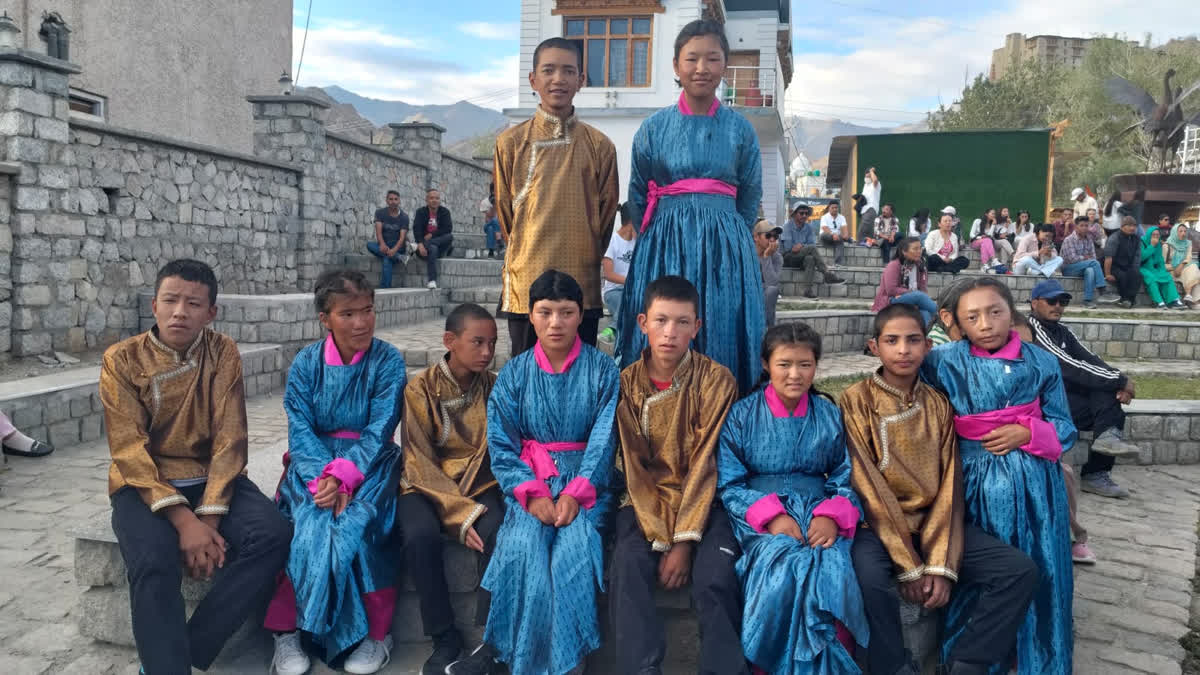Leh, Ladakh: Education is often seen as a great equalizer, but for differently-abled children, access to inclusive learning environments remains a challenge.
While India passed the Persons with Disabilities (Equal Opportunities, Protection of Rights and Full Participation) Act in 1995, its implementation on the ground is still far from widespread. However, in the heart of Ladakh, the Government High School at Chuchot Yokma, is rewriting this narrative by being the only inclusive school in the region. Sonam Wangchuk, Chief Education Officer, Education Department Leh, says, “Over the last 10-15 years, we have made this school inclusive. The moment we got the hostel under the Netaji Subhash Chandra Bose Awas Yojana scheme, we started enrolling differently-abled students. At present, most of the students staying in the hostel are specially-abled, while others are day scholars”.
He further added, “As per government policy, we must enroll differently-abled children in mainstream schools rather than creating separate institutions for them. Keeping this in mind, we have designated Chushot School for such students, as it offers necessary facilities such as transportation, a hostel, and proximity to SNM Hospital. In addition, several NGOs, including PAGIR and Munsel and REWA Society work for specially-abled children in Leh”.
With 34 differently abled students studying alongside their peers, the school is fostering an environment where education is all inclusive. Equipped with specially trained teachers, resource rooms, and therapy sessions, the school proves that inclusivity is not just an ideal but a working reality. The efforts of educators and students alike are paving the way for a more integrated and accepting society—one where disabilities do not define a child’s potential. Wangchuk says, “We currently have three special educators at Chushot. This year, our plan is to upgrade the school to the 10+2 level. Inclusive education is crucial, as earlier, many parents would not disclose their child's condition and kept them at home. To address this, we conduct zone-wise assessment camps, known as environmental building, for specially-abled children across different regions to spread awareness. Additionally, we plan to increase enrollment and make the school fully functional. Currently, we have students from Nubra, Sham, Changthang, and even from Doda.”
Rigzin Ladol who has been one of the special teachers at the school for almost seven years said the differently-abled students at the school mostly suffer from intellectual disability, hearing impairments and there are some cases of down syndrome. “In my tenure 2 of our differently abled students have gone on to complete their education from college and are currently working. Other students have become part of People’s Action Group of Inclusion and Rights (PAGIR) which is a non-profit organisation started in Ladakh in the year 2007 and are working towards the need of the differently abled", she said.
Ladol highlights that it takes an ample amount of time and patience while teaching such kids. "In order to facilitate the differently abled children we also engage in resource room teaching which is an extra time we give to the differently abled children so that they can be with the same timeline of syllabus as the other kids. According to her, there are far more benefits of inclusive education as compared to schools designated only for differently abled children", she says. Ladol further says, “When we teach the students in an inclusive classroom basic sign language is taught to everyone so that they can communicate with each other. As a result of this they get to experience learning from their peer group. For instance, when I am teaching something and they don’t understand a concept, they end up asking their classmates as everyone knows sign language and in a way learning from your peers gives them a better understanding.”
As the differently abled children interact with other kids on a daily basis there are also many positive changes in their behaviour. These factors contribute to the future prospects of the differently abled children and learning sign language gives the other children an edge over other school children. In the current academic year, there are a total of 93 students enrolled in this unique school, with 34 of them being differently abled. The school also provides online classes to six students who are severely disabled so that they do not miss out on the opportunity of getting an educational degree and during the exam session they are provided with specially designed question papers. Along with this the school provides hostel facilities to the differently abled children who come all the way from Kargil, Zanskar, Nubra and Changthang. The children are also provided with therapy sessions such as speech therapy and physiotherapy, which they receive two days at the school and two days at the hospital, Ladol says.
“Inclusive education is really beneficial for these children as in the future they have to be a part of society and learn the art of socializing and interacting with different people. The school acts as the building block for the differently abled children to learn how to interact with people and this in turn helps them in the future when they step into society,” says Kunzes Lamo another special teacher who has been teaching at the school for last one year.
She adds, “When the differently abled students and the other children interact with each other language development for the differently abled children is faster and there is also a rise in confidence. I have also seen them participate in stage performances with confidence and not be hesitant in getting up on stage as compared to other institutions for differently abled students.”



